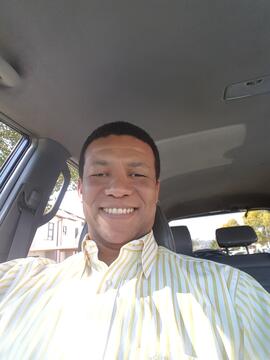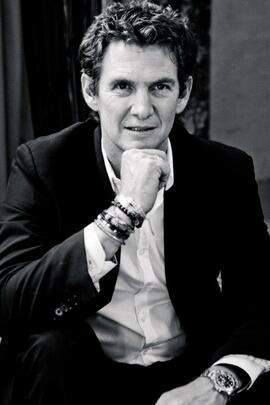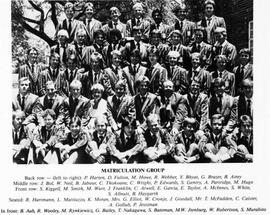Interview with Cecil Thokoane 1985
- ZA ZAR STDS 202000731
- Pièce
- 2012
Interview with Cecil Thokoane – 1985
Cecil came to St David’s in June 1982 at the age of 12 into standard 7 and matriculated in 1985
age 16. Cecil was born in Soweto and went to a government school for his primary schooling. In
standard 3 his teacher thought he was too smart and he was promoted to standard 4. Cecil’s
mother wanted him to go to a Catholic school either Holy Cross or St Matthews, run by the
nuns. In May 1982 Sister Michael gave him a letter in which he was awarded a scholarship by
British Petroleum for tuition at St David’s. Fortunately his school colours were the same and he
got the rest of his school uniform from the swop shop. It was quite an experience, not knowing
who, where or what but he was made to feel welcome and at home. Even so it was quite a
transition and, since his mother had taken him to school by tram which stopped at Dunkeld he
had to find his own way home and got lost walking back. Eventually he used to ride in a Combi
with much younger boys to school but as he had to stay later for sport he had to use public
transport to get home. He used to have to get up at 5.00am and spend an hour travelling to
school and when he had sport it would take him even longer to get home.
He remembers meeting Mr Murphy and being mobbed the first lunch hour and given a crash
course in rugby. He went into Osmond house and when he finally settled in was able to excel
academically. He learnt to play rugby, becoming quite a good player making the A team. He
also performed well at athletics and collected a number of accolades including being awarded
the Sandton Mayorial Trophy two years in a row and breaking the record for the 800m.
Cecil was not a member of the swimming team and tells the story of how he nearly drowned
earning the wrath of Willy Castle. He had been at the school a couple of months, it was the
beginning of the summer/spring season and PT shifted to the swimming pool where the boys
were going to play water-polo. Being just 12 he thought he could just swim and got into the pool
at the deep end and promptly proceeded to sink. Fortunately one of his class mates, Steve the
American, spotted him and rescued him. By lunch time the whole school knew that he had
nearly drowned and he only started taking lessons two years ago in 2009 overcoming his fear.
Cecil enjoyed playing rugby and gradually improved becoming quite a good kicker. His first
rugby game was quite funny as he had literally been given a week’s classroom tutorial about the
game. He went in as a sub and when he first saw this mean faced, spitting, fuming guy from
Parktown Boys barrelling down on him and, even though it was his first game ever, he sensed
that if he were to let him go past he would score and right royally embarrass him. He caught him
with a high tackle, he didn’t score, they were penalised but didn’t lose any points. This was his
debut into 4 years of sweat, pain and fun as well.
He remembered a particular rugby game. It was during an U14 game and St David’s was trailing
9-11. He thought they had lost the game, in front of a full crowd waiting to watch the 1st team
match against Marist Observatory, the match of the season and compulsory. There were literally
a few minutes left to the last whistle and as fullback he was lounging under the poles and then
they were awarded a penalty 10 or so metres into their half. He thought that the front would run
the ball and attempt a try. Next thing he heard his name being called, the team wanted him to
kick for goal and earn 3 points. He told them it was too far and they shouted that he had made
those kind of kicks during practise. So all of a sudden everyone was looking at him, the whole
place was quiet. He went up, made a nice sand mound and started taking his back-step, only
this time he went back at least 20 metres; all the while saying his Hail Marys. He took what felt
like a long slow motion run and kicked that ball with all his might. His kick was dead straight
and, from his vantage point it looked as if the ball had fallen short. Next thing the whole stadium
erupted with jubilation. It took seconds for him to realise that he had scored the penalty from
that distance and had also won the school the game. His moment of glory! The first team went
on to win their match and on monday he had the pleasure of the whole episode being recounted
to the school at assembly.
Another game he remembered was an U14 away game at Parktown Boys, the ref was a 1st year
student from Wits and half the guys were bigger than Cecil. They had been having a bad
season so the game deteriorated pretty quickly and the ref completely lost control with full on
brawls on the field. The game was abandoned and Cecil was in a bit of a fix because he
planned to walk from Parktown Boys into town to catch his bus home. After the fight he was the
only blue and yellow rugby shirt in a sea of black and red. In the spirit of sportsmanship they
chuckled about the fights during the game as he made his way to the gate – the year of living
dangerously.
Most rugby games were a mixture of excitement and fear. There simply weren’t many black
children playing rugby and a lot of times Cecil could see the other team marking him up as he
got off the bus in all cases to try and make his game a misery. However he was lightning fast
and they couldn’t catch him most of the time and his Marist brothers and team mates were
always close by to bring woe unto whoever felt the urge to harm him outside the normal rules of
the game. Unfortunately because the riots were so bad, he stopped playing rugby in Matric and
he didn’t make the 1st team.
The teachers he remembered were Mrs Evans for making him feel welcome when he first
arrived at St David’s. Mrs Evans caused an explosion during a Chemistry class. She was
showing how sodium, he thought, reacted with water. The boys started to urge her to throw in
larger chunks and a large explosion followed which the boys thought was awesome but left Mrs
Evans very red-faced.
Mr Boswell understood where he came from and found a family, the Hoffmeyers for him to stay
with during the Matric exams literally saving his life as the Combi he normally travelled in was
attacked and he would have been targeted. Mr Colia was always cold and hard but made him
want to really prove himself at Maths. Mr Farrel,for enabling him to enjoy History, his only
distinction in Matric and Mrs Elliot for teaching him to love Shakespeare. He shocked her by
getting a first class English pass for Matric, so much so that she wrote him a card expressing
her joy.
Cecil was awarded scrolls for History and Biology. He couldn’t participate in school plays etc
because the travelling was so difficult. He used to get nervous doing orals in front of the class
and remembers talking about his then hobby ballroom dancing which caused some hilarity. On
his last day he wrote Afrikaans and stayed with the Hoffmeyers going home the following
weekend. He was sad to leave St David’s where he had grown up intellectually and as a person.
He had an awesome time and came into an environment where he became good at sport and
was given the opportunity to reach new heights.
After school Cecil went to Wits to study mining engineering which was a disaster as he realised
he was not mechanically inclined. He then went to the University of the Western Cape where he
studied for a BSc majoring in Maths and Physics and his minors were in Computer Science and
Applied Maths with dreams of working as a nuclear physicist. Later he also completed an MBL
through Unisa. Although he was sponsored by BP he was recruited by Engen when his career
in IT began. He also worked for the stock exchange, IBM and a start up company for 3 years
which failed. He then went on to Dimension Data and worked with Jason Goodall, an Old Boy of
the same year, as chief technical officer for Middle and East Africa. Jason is currently the MD of
Dimension Data. Cecil is now running his own company; Galeboe Professional Services which
has grown 300 – 400%.He is a finalist in the Finance Week competition for entrepreneurs.
Cecil is also vice-chairperson of the Unisa Alumni Committee and a non-executive director of
the Unisa School of Business Leadership. He has three daughters Jade 13, Tyler 11 and Eisha
6 all pupils at St Teresa’s where his wife went to school.
He is a member of MOBS and is in touch with a number of old boys such as Jason Goodall,
Branden Aab, Solly Maponya, Walter Cronje, Jeremy Franklin, Eugene Taylor, Paul Johnston
and Rees Carr.
JLE June 2012
Egenrieder, Julie



